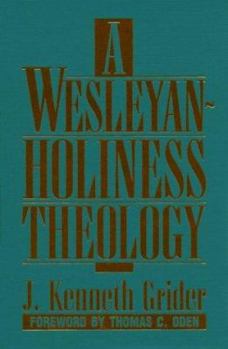A Wesleyan-Holiness Theology
This is a systematic theology for the clergy and alert laypersons of the many Wesleyan-Holiness denominations and parachurch groups and for United Methodism itself--as well as others who wish to know... This description may be from another edition of this product.
Format:Hardcover
Language:English
ISBN:0834115123
ISBN13:9780834115125
Release Date:May 1994
Publisher:Beacon Hill Press of Kansas City
Length:592 Pages
Weight:1.94 lbs.
Dimensions:1.6" x 6.0" x 8.8"
Customer Reviews
4 ratings
Wesleyan Holiness Theology
Published by Thriftbooks.com User , 15 years ago
Two of the finest theologians in the Church of the Nazarene published works which distill a lifetime of reading and thinking and teaching, giving us slightly different versions of the "scriptural holiness" espoused by the denomination which has nurtured them. I read J. Kenneth Grider's recently-released A Wesleyan-Holiness Theology (Kansas City: Beacon Hill Press of Kansas City, c. 1994) and decided to re-read it while re-reading H. Ray Dunning's Grace, Faith & Holiness: A Wesleyan Systematic Theology (Kansas City: Beacon Hill Press of Kansas City, c. 1988), which I'd read shortly after its publication. By moving from one to the other, comparing their presentation of different subjects, I was able to make some comparisons--as well as learn from both of them! By and large, the two men have much in common. Were I so inclined, I could simply show how they jointly support the central dogmas of the Christian faith. They both believe in God the Father, Son, and Holy Spirit. They both assert Jesus was God's Son, fully God and fully man, who was crucified and rose again. However, there are some important differences between the two, so I'll focus on a few of them. First of all, on a simple stylistic level, I find Grider's work the more readable of the two, even though it's more clearly based on his class lectures and lacks some of the tightly-reasoned discussions and scholarly quotations which mark the Dunning treatise. Grider has a sense of literary style, uses illustrations, cites biblical texts, and presents his material more simply than Dunning, who is admittedly more thorough, more analytical, more carefully organized, persistently dialoguing with assorted theologians of his generation. Consequently, Dunning's language often grows ponderous and overly-abstract, making it more accessible to professors than students of theology. Grider, furthermore, seems more attuned to the methodology and theology of the Early Church than Dunning, who more diligently explores the works of John Wesley and contemporary thinkers such as Paul Tillich. Grider, for example, looks to St Athanasius for guidance, unabashed by his antiquity, whereas Dunning tends to treat him as an admirable architect of an antiquated culture. Grider tends to find Augustine's insights as nourishing today as when first written, whereas Dunning treats him more as an interesting reflection of his era--as, for example, when he responded as he did (in The City of God) to Rome's collapse. Dunning seems con¬cerned to root himself in the Enlightenment's worldview, staying attuned to "modernity." Grider, more like Tom Oden, who writes a complimentary foreword for him, espouses a "pre-modern" approach which may well be better suited to the "post-modern" world we now, perhaps, inhabit. The differences between the two men is further evident their modus operandi. Grider's methodology, which he labels "biblical realism," proposes that we can know truth about God as Re
Excellent Theological Work
Published by Thriftbooks.com User , 17 years ago
Sound theology presented in a scholarly, yet easy to understand writing method.
A fine reference and advanced primer in theology
Published by Thriftbooks.com User , 19 years ago
If you're a committed Arminian/Wesleyan/Holiness type, this is a great shelf reference or a good bedside read. It is readable (not easy in a theology text) and very practical. Grider's treatment of issues is purely from the Wesleyan/Holiness end of the theological spectrum. If you're a Presbyterian or Baptist, get an R.C. Sproul volume instead. I like the fact that the nuts and bolts are treated in reasonable simplicity while including detail, without getting too bogged down in the arcana typical in an academic work. You can read this book. The footnotes are quite good (again, this is not an academic text for MDiv/DMin students) and surprising in their content and variety. This was one of the best gifts I have received as a preacher. I recommend it to any Arminian as a great reference, laity training tool, or as a desk reference for pastors/preachers of other Christian traditions.
superbly written, a wonderful book
Published by Thriftbooks.com User , 23 years ago
As a layperson interested in learning more about Wesleyan-Holiness Theology, this book far exceeded my expectations. It is written in plain english, well-organized and filled with deep insights. For me, this was one of those "you'll never be the same after you read it" books. A wonderful book that I return to time and again for spiritual growth and inspiration. Great bibliography too - this book introduced me to other significant resources (like Wiley).






